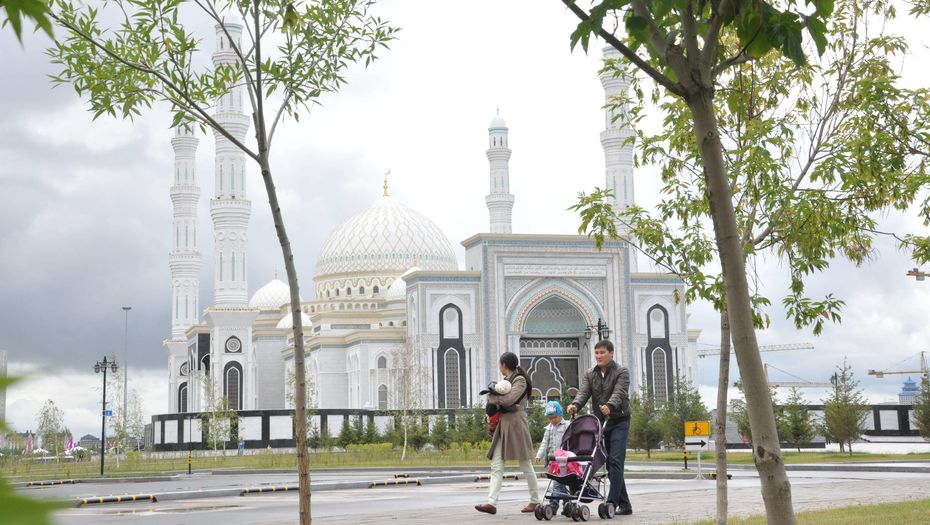As the Holy Month of Ramadan came to an end, Muslims around the world, and in Kazakhstan, celebrated Eid al-Fitr, also known as Eid, on Sunday May 24. But while the world is still struggling to curb the pandemic, this year’s Ramadan, which started April 24 and ended May 23, and Eid, brought a very different experience for many.

Mosques usually packed with people coming to pray this year were unusually empty. Photo credit: informburo.kz
Ramadan is the ninth month of the lunar Islamic calendar when Muslims fast from dusk till dawn, but the essence of the holy month goes beyond abstaining from food and drinks, but also sexual activity, negative emotions, and sinful behavior.
As places of worship were closed and gatherings were prohibited to prevent the spread of the coronavirus infection, this year’s Ramadan meant there would be no gatherings, no communal prayers at mosques, no iftars (evening meal breaking the fast) usually shared with family and friends, and no festivities to mark the end of the holy month.
Community leaders urged people to stay at home for celebrations.
“Unfortunately, due to the quarantine situation, we have to celebrate the occasion in special conditions. Since the epidemic brings everyone at risk, precautions must be taken. Therefore, it is best to spend Ait (Eid in Kazakh) at home with your family. A Muslim must congratulate family and friends on the holiday. Please take the statement of Kazakhstan’s Spiritual Administration of Muslims with understanding and celebrate Oraza Ait at home. May Allah accept our fast, good deeds and prayers in the holy month of Ramadan,” said Nur-Sultan city’s chief imam Yerbolat Zhussipov.
Despite these circumstances, Muslims have found ways to see the positive side of the situation and for some citizens, observing Ramadan in lockdown was a sacrifice for a good cause.
“Due to quarantine, this Ramadan was unlike previous years, but these measures taken were for a good cause and helped us observe the fast with greater mindfulness,” said capital resident Zayatgul Myltykbayeva, 64, who has observed Ramadan for 13 years, in an interview for the story.
Movement restrictions and isolation also helped to make it easier to observe the fast, as physical activity was minimized.
Ramadan in lockdown also taught a lesson to the younger generation.
Capital resident Binur Yermukanova, 25, believes that this year’s Ramadan was very special, and believes people understand the value of prayers together at mosques and the joy of seeing relatives and friends.
During Laylat al-Qadr, or the night of power, known as the night when the first verses of the Quran were revealed to the Prophet Muhammad, one of the most important wishes people prayed for, said Yermukanova, was for people to be safe, for the epidemic to stop not only in Kazakhstan but throughout the world.
Botagoz Osipova, a capital resident, said she was a bit sad that the circumstances did not allow people to gather together.
“I watched the live broadcast from Hazrat Sultan mosque, but it is not the same feeling as when you are in the home of Allah when you can feel the presence of angels behind your shoulders on your skin. Amid this pandemic, chaos, and human anxiety, the month passed quite fast, but was not filled with the deep meaning it usually has,” she said.
This year, citizens had a chance to pay Sadaqa Al-Fitr online, which is a charity donation meant to be paid by devout Muslims before the end of the holy month to help other Muslims who do not have enough to feed themselves and their family members. In normal circumstances, the donation is usually made through a mosque.
Mosques in Kazakhstan also conducted lectures online throughout the month as part of the “30 Conversations in 30 Days” campaign meant to support the Muslim community in these trying times.
Kazakhstan’s Spiritual Administration of Muslims also streamed live on their YouTube and Instagram channels to mark the Laylat al-Qadr.
Mosques across Kazakhstan provided help to nearly 100,000 low-income families and charity iftar meals. They also sent humanitarian aid to citizens who suffered from floods in the Maktaaral district in southern Kazakhstan and financial assistance totaling ten million tenge (US$24,041).
“I would especially like to thank all the citizens who participated in this good cause during the holy month. May Allah be pleased with them! People say that investing in good will return good back to you. We pray that the good that they do will return in the form of a great blessing,” said Kazakhstan’s Supreme Mufti Nauryzbai Kazhy Taganuly.

